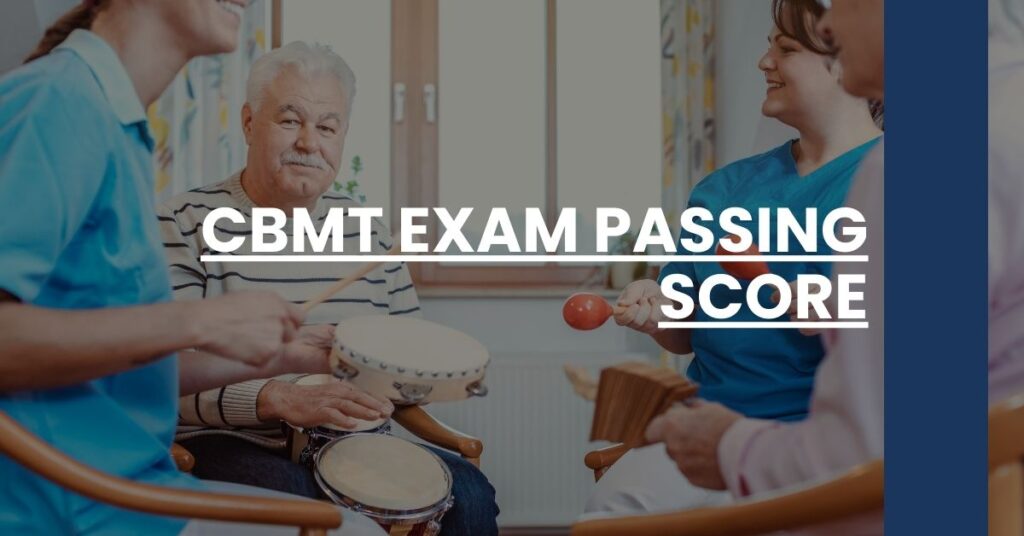The passing score for the CBMT exam is not a fixed number; instead, it adapts to maintain consistent standards of competence. To pass, candidates must demonstrate a strong command of music therapy knowledge and skills covered in the multiple-choice questions.
If you’re gearing up for the CBMT:
- Understand the structure and subjects of the exam.
- Learn how the passing threshold is set.
- Discover effective preparation strategies.
Remember, a passing score marks a significant milestone in your music therapy career, opening doors to professional growth and opportunities.
- Introduction
- Understanding the CBMT Exam
- The Importance of the CBMT Exam for Music Therapists
- The Structure of the CBMT Exam
- Defining the Passing Score for the CBMT Exam
- Factors Influencing the Passing Score
- Preparation Tips for Achieving the CBMT Exam Passing Score
- Common Misconceptions About the CBMT Exam Passing Score
- How to Interpret Your CBMT Exam Results
- Retaking the CBMT Exam: What You Need to Know
- The CBMT Exam Passing Score and Your Career Advancement
- Staying Current: Recertification and Continued Education
- Conclusion
Introduction
As you embark on the journey to become a certified Music Therapist-Board Certified (MT-BC), you’ll encounter a significant milestone: the Certification Board for Music Therapists (CBMT) Exam. This exam is the gatekeeper to your professional certification, a testament to your expertise and commitment to therapeutic excellence. Understanding the CBMT exam passing score is crucial, as it’s not just a number; it’s the benchmark that will validate your qualifications to employers, clients, and the music therapy community.
Grasping the ins and outs of the CBMT exam, including how the passing score is determined, can alleviate some of your exam anxiety and equip you with the knowledge needed for success. Let’s take a dive into what this exam entails and what you need to score to join the ranks of board-certified music therapists.
Understanding the CBMT Exam
The CBMT exam is a rigorous assessment designed to evaluate your knowledge and skills in music therapy. It’s the key that unlocks the door to a career filled with harmony and healing. As you approach this challenge, it’s important to know that the exam covers a wide range of topics, including psychological basics, clinical applications, and music fundamentals—all essential ingredients in the music therapy mix.
The certification gained upon passing this exam is not merely a badge of honor; it’s a globally recognized credential that assures clients and the medical community of your expertise. This is why understanding the nature and structure of the CBMT exam is paramount. You’ll need to immerse yourself in a broad spectrum of topics and hone your test-taking skills to ensure you’re fully prepared on exam day.
The Importance of the CBMT Exam for Music Therapists
Achieving a passing score on the CBMT exam is a critical step in your music therapy career. It signifies that you have met national standards and are equipped with the necessary knowledge and skills to practice safely and effectively. Imagine being part of a community that boasts over 10,064 certified members—professionals who’ve proven their dedication to enhancing lives through the therapeutic use of music.
Embarking on this journey signals that you’re ready to make a significant impact in the lives of those you serve. The CBMT exam is more than just a test; it’s a declaration of your commitment to professional growth and evidence-based practice, setting the stage for your future success in the field of music therapy.
The Structure of the CBMT Exam
Understanding the structural blueprint of the CBMT exam is instrumental in your study strategy. The exam consists of 150 multiple-choice questions that you will tackle within a three-hour window. These questions are designed to test your theoretical knowledge and practical skills across various domains of music therapy practice.
Given its comprehensive nature, the CBMT exam requires an intimate understanding of each subject area. It’s not enough to have surface-level knowledge; you’ll need to dive deep into the content to answer questions with confidence. Structuring your study time effectively and familiarizing yourself with the format will position you for the best chance of achieving the elusive passing score.
Defining the Passing Score for the CBMT Exam
Now to the heart of the matter: the CBMT exam passing score. The CBMT uses a criterion-referenced passing point, meaning that the score reflects your ability to perform tasks and make decisions like a competent music therapist would. Instead of being graded on a curve or ranked against fellow test-takers, your performance is measured against a predetermined standard.
Unfortunately, the exact number of correct answers you need to pass isn’t set in stone—it can vary based on the exam version and the difficulty of the questions. This flexible passing point ensures fairness across different test iterations, but it also means you’ll go into the exam without a clear target score. What you can aim for, instead, is mastery of the material and confidence in your test-taking strategy—essential ingredients for exam success.
Factors Influencing the Passing Score
You might wonder, if not a fixed number, then what factors determine the CBMT exam passing score? Psychometric methods guide this calibration—ensuring that regardless of which form of the test you receive, the passing score is adjusted for fairness and accuracy.
Sophisticated statistical analyses are conducted to measure the difficulty of each question and the exam as a whole. This scrutiny means that, while the score itself may be a moving target, the competence it represents remains constant. It’s a testament to the integrity of the certification process, one that requires a comprehensive understanding of music therapy principles and practices.
Your focus should not be on guessing what the passing number might be but rather on integrating the breadth and depth of knowledge that the exam assesses. By grounding yourself in the material and honing your critical thinking skills, you will be well on your way to achieving not just a number, but a standard of professional excellence.
Preparation Tips for Achieving the CBMT Exam Passing Score
Achieving the CBMT exam passing score requires a combination of diligent study, strategic test-taking, and a calm, focused mindset. Here are some tried and true tips to prepare you for success:
- Understand the Format: Familiarize yourself with the types of questions on the CBMT exam by reviewing sample questions and practice tests. Knowing what to expect can significantly reduce test anxiety.
- Create a Study Plan: Assess the areas you need to focus on and allocate your study time accordingly. Prioritize topics based on their difficulty and your level of confidence.
- Use Relevant Study Material: Quality resources such as the CBMT Candidate Handbook provide detailed information about the exam content and format.
- Form a Study Group: Engaging with peers can help you gain different perspectives and enhance your learning through discussion and collaboration.
- Take Practice Tests: Simulate the exam experience to build your stamina and time management skills. This practice also helps to highlight areas where you may need extra review.
- Rest and Recharge: Regular breaks and self-care are crucial. Ensure you’re well-rested, hydrated, and nourished, especially as the exam date approaches.
- Stay Positive: Confidence can greatly impact your performance. Maintain a positive mindset and visualize success.
Remember, your goal isn’t just to pass the exam but to solidify your understanding of the rich body of knowledge that underpins music therapy practice. Keep your focus on thoroughly grasping the material, and the cbmt exam passing score will follow.
Common Misconceptions About the CBMT Exam Passing Score
It’s easy to stumble upon myths and misinformation when it comes to the CBMT exam passing score. Let’s clear the air:
- Myth: You need to achieve a certain percentage to pass.
- Myth: If the exam feels easy, you’re more likely to pass.
Armed with the facts, you can approach the CBMT exam with clarity and confidence. The key is to concentrate on the quality of your preparation, not rumors or speculation.
How to Interpret Your CBMT Exam Results
Once you’ve completed your exam, interpreting your results becomes the next hurdle. Though the CBMT doesn’t provide a numerical passing score, you will receive a score report indicating “pass” or “fail.” If you pass, congratulations! You’ve met the threshold and demonstrated the competencies required of a board-certified music therapist. If not, the report will highlight areas for improvement, guiding you on where to focus your studies for a successful retake.
Understanding how to enhance your skills based on the feedback can make your next attempt victorious. Remember, each attempt brings you closer to your goal. Keep learning, keep growing, and let each exam experience enrich your professional journey.
Retaking the CBMT Exam: What You Need to Know
If you don’t pass the CBMT exam on your first try, don’t be disheartened. Many successful music therapists don’t pass on the first attempt. The CBMT has policies in place for retaking the exam. While specific details, such as waiting periods and retake limits, should be confirmed through the official CBMT FAQ page, know that you have the option to sit for the exam again.
Regroup, refocus, and use the experience to better prepare for the next round. Each attempt is an opportunity to solidify your knowledge and hone your test-taking skills.
The CBMT Exam Passing Score and Your Career Advancement
Passing the CBMT exam is an investment in your career with long-term dividends. It’s more than just a certificate; it’s a testament to your expertise and commitment to the field of music therapy. Once you’ve achieved a passing score, it’s time to celebrate your hard-earned credential and turn your attention to the future.
With your official MT-BC title, doors will swing open to various professional opportunities. Whether it’s advancing in clinical settings, opening your private practice, or contributing to the research and development of music therapy, your certification is key to a fulfilling and dynamic career.
Staying Current: Recertification and Continued Education
Earning your MT-BC credential is just the beginning. To ensure your practice stays current and effective, you’ll engage in ongoing professional development. The CBMT requires board-certified music therapists to recertify every five years, a process that typically includes continuing education and clinical practice hours.
Recertifying solidifies your standing in the community and reaffirms your dedication to excellence. As you navigate this process, embrace the opportunity to expand your expertise and reflect on your growth as a music therapist.
Conclusion
As you prepare for the CBMT exam, keep your sights set on the broader picture. It’s a challenging but rewarding journey, culminating in a certification that validates your skills and unlocks a world of professional opportunities. Your path to achieving the cbmt exam passing score is one of growth, learning, and self-discovery.
Put in the work, trust your abilities, and approach the exam with a resilient spirit. Remember that your end goal extends beyond the score; it’s about becoming a part of a passionate community dedicated to healing through music. Embrace each chapter of this adventure, and let it lead you to a fulfilling career that harmonizes your talents with the needs of others.
CBMT exam passing score: Essential for certification, our guide outlines what music therapists need to achieve to succeed professionally.

